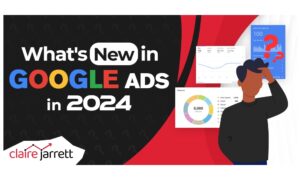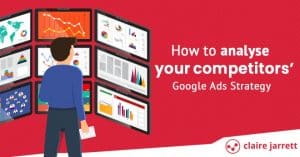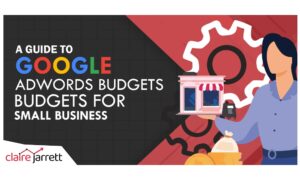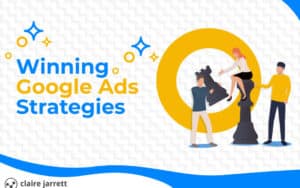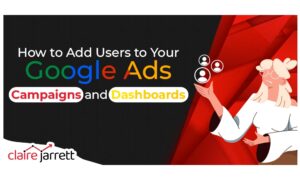ChatGPT for Google Ads – Top 10 Use Cases
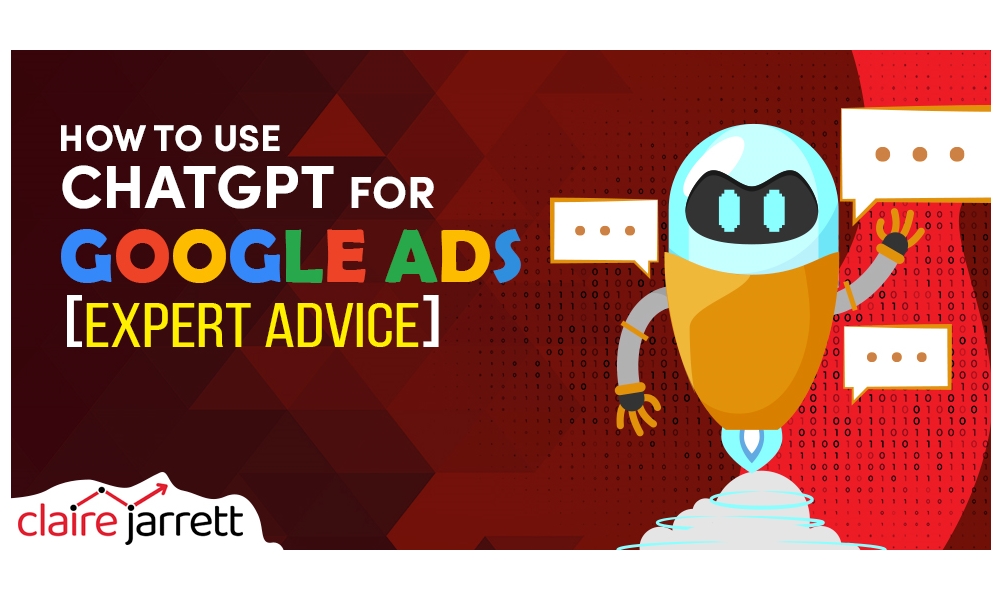
Last Updated on: 7th February 2025, 04:07 pm
Can you use ChatGPT for Google Ads? Yes! We’ve used it for research, campaign structure, headlines, keywords; the list goes on. We ran an experiment and will be revealing the top 10 ways to use ChatGPT in your Google Ads campaigns. (And will give you rare information such as how to create a lead magnet without coding)
We will also walk you through the limitations and best practices for prompts. To kick things off, here’s a few of the tasks that ChatGPT can perform for Google Ads:
- Google Ads research
- Create lead magnets and interactive content
- Structure Google Ads campaigns
- Create ideas for Ad Groups
- Write Google Ads headlines and descriptions
- Identify keywords to bid upon
- Come up with ideas for negative keywords
- Draft landing pages (and other pages, too!)
- Get ideas for creating high-converting landing pages
- Create scripts for YouTube ads
- Research audiences
- Identify and create Ad Extensions
- Analyse performance and data
Let’s jump into the experiment! If you like, you can click the dropdown arrow on the right hand side to view the table of contents – this is a meaty guide.
Experiment: How to Make the Most of Your ChatGPT Session for Google Ads Research
ChatGPT can’t wholly replace your marketing team and your Google Ads experts, but it has plenty of use cases that save time (and money).
I approached my experiment with the following criteria in mind:
- Can ChatGPT simplify some of my regular PPC campaign prep tasks with its AI?
- Is the information detailed enough to make decisions?
- Can it provide any new insights?
- How far can I take ChatGPT with research for Google Ads?
The results were interesting (and positive)!
Best Practices: Using ChatGPT for Google Ads
- Be as specific as possible when prompting ChatGPT for Google Ads.
- For example, if you are promoting a plumbing business, specify where it’s located, which services it offers, who it’s run by, and any other differentiating information.
- My results were better when specifying that my “client” was a family-run business; ChatGPT needs data to generate outstanding results.
- Specify your constraints. If you simply ask for “Google Ads headlines,” ChatGPT could provide headlines longer than 30 characters.
- Specify your tone of voice. Ask it to be formal, casual, inspirational, etc.
- Understand ChatGPT’s limitations.
- It specialises in qualitative data (e.g., descriptive over definitive, numerical answers).
- ChatGPT’s knowledge cutoff is 2021. It can’t provide fresh information like accurate keyword volume or current competitors.
- Follow up with ChatGPT to get better responses for your Google Ads prompts. It remembers the conversation history, so:
- Ask it to expand on a point.
- Pose additional questions.
- Double-check the answers for accuracy.
- Supplement ChatGPT generations with expertise, whether through your personal experience or Google Ads coaching.
10 Ways to Use ChatGPT for Google Ads
Use Case #1: Ask for Help
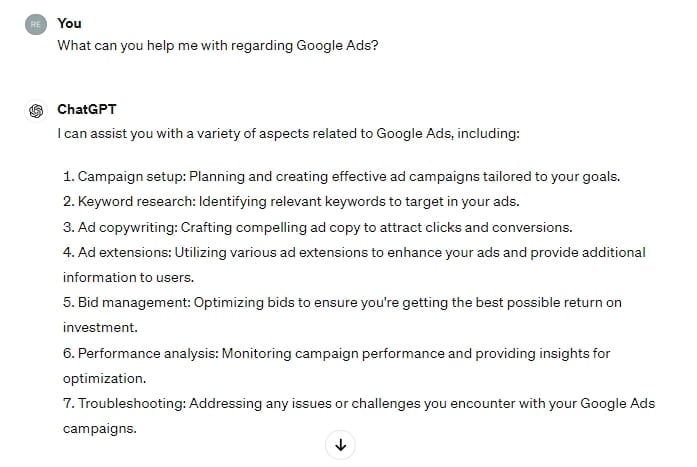
Did this prove to be valid during the experiment?
Partially.
ChatGPT was able to help with basic keyword research and providing a draft for landing pages. It also offered some decent campaign structure insights.
However, it struggled to provide definitive information on competitors, keyword volumes, and other essential research points. This would require numerical and fresh data, which it doesn’t have access to.
Understand Advanced Google Ads Features
If you’re new to Google Ads, you can ask ChatGPT to explain how to use the more advanced strategies and features, such as automation scripts:
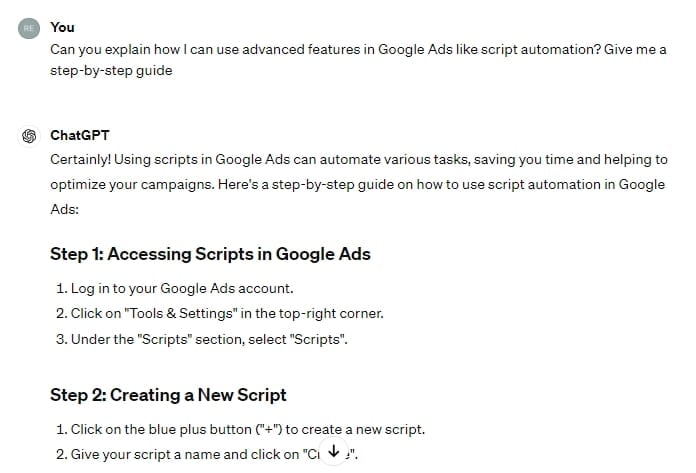
Quite straightforward! It’d be a good teacher!
(My Favourite) Use Case #2: Creating Lead Magnets and Interactive Content (without Coding)
If you’re a plumber like my “client,” wouldn’t it be nice to have a landing page with something like an estimate calculator?
Your leads could immediately get an estimate, decide if it’s within their budget and contact you, which would increase your Quality Score and conversions.
Usually, you’d need a programming expert for that. But after asking ChatGPT to help me, it generated a JavaScript code:
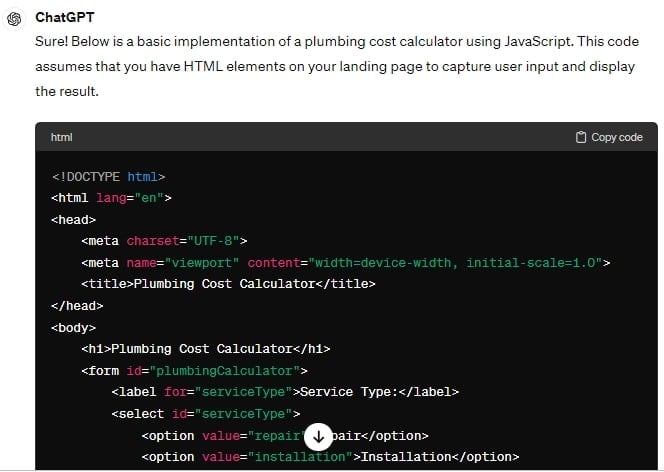
Well, I’m not a programming expert, so I asked ChatGPT how I could add it to my WordPress site.
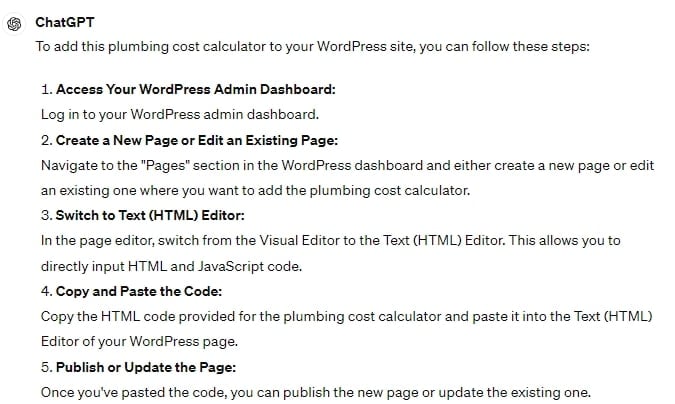
Ultimately, I got a fantastic and quick way to make PPC landing pages stand out, so my Google Ads clients can pay less for each click while converting more prospects.
If you want to do something similar, consider what might be helpful to your leads as a lead magnet. It doesn’t have to be a cost estimator – it can be:
- A quiz to help leads choose the right service/product
- A downloadable checklist
- A spreadsheet template
Or anything else!
Use Case #3: Is ChatGPT Any Good at Structuring Google Ads Campaigns?
If you’re launching your first Google Ads campaign, you might need some help.
You’ll get basic pointers when you ask ChatGPT for help, but not much beyond that. This is where you can see its limitations.
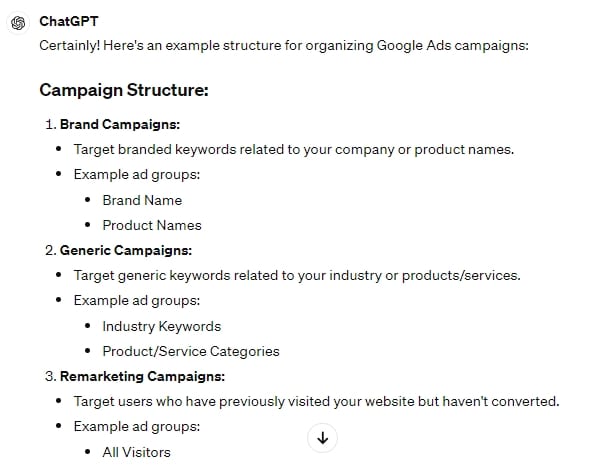
Currently, ChatGPT cannot analyse specific Google Ads data at scale. Google does have its own AI, which you might want to consult on the best bidding strategy, but it’s still imperfect.
The verdict? Humans will have to tackle Google AdWords campaign structures without ChatGPT.
ChatGPT Is Much Better at Creating Ad Groups
ChatGPT neatly divvied up the different types of plumbing services. This makes sense; you wouldn’t use the same ad to target prospects with an emergency and leads who need an extensive renovation project.
Still, I would sanity-check the suggestions.
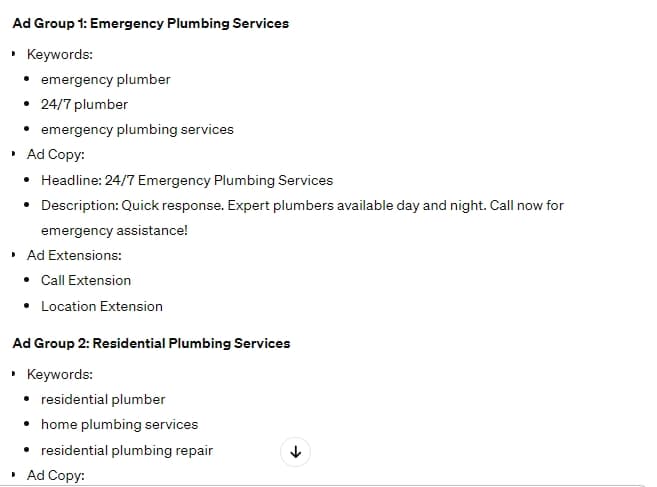
Use Case #4: ChatGPT and Google AdWords Keyword Research
I’ve wanted to test this one since I first heard about ChatGPT! I had used it to generate some blog topics, but this was different – this was the competitive PPC space.
Could I trust it with so much (hypothetical) money on the line?
I was specific about my requirements:
- The industry and the location
- The monthly search volume
- Listed & formatted as a table
What’s interesting is that ChatGPT contradicted itself. First, it provided the table with search volumes:

Fantastic! But knowing that its knowledge cutoff is 2022, would the data be accurate?
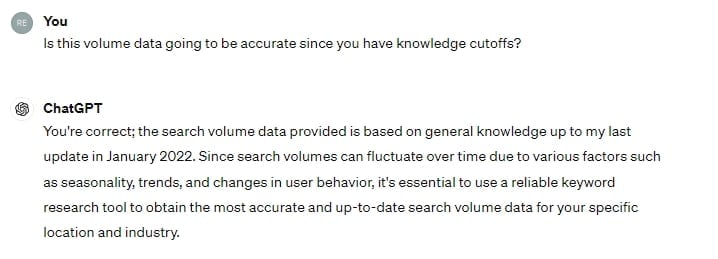
It claimed that it estimated the search volume using a keyword research tool. But when I asked which specific tool it used, it said it could not use tools (despite contradicting itself in the first answer by mentioning Google Keywords Planner).
Negative Keywords
I also tested ChatGPT for negative keywords, i.e., keywords the plumbing business should add as negatives to avoid wasting the budget on low-quality leads.
Most of the suggestions were valid but focused on preventing the ad from appearing for irrelevant intents.
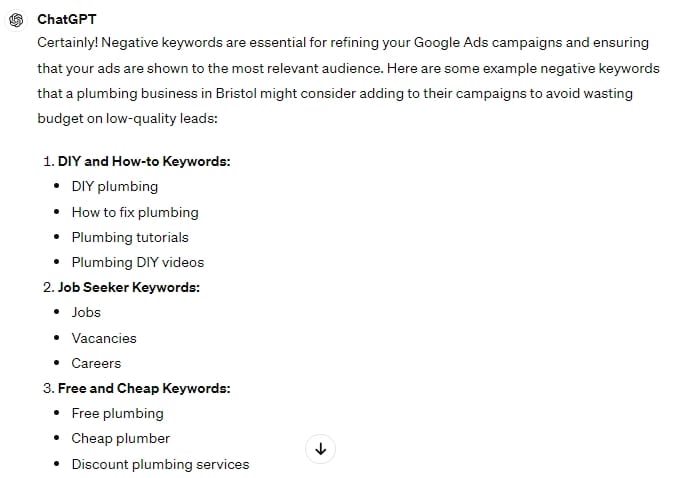
Suppose our client only wanted to work with commercial leads, e.g., business owners.
ChatGPT offered a few more suggestions but barely scratched the surface (we like to add several hundred negative keywords to most campaigns):
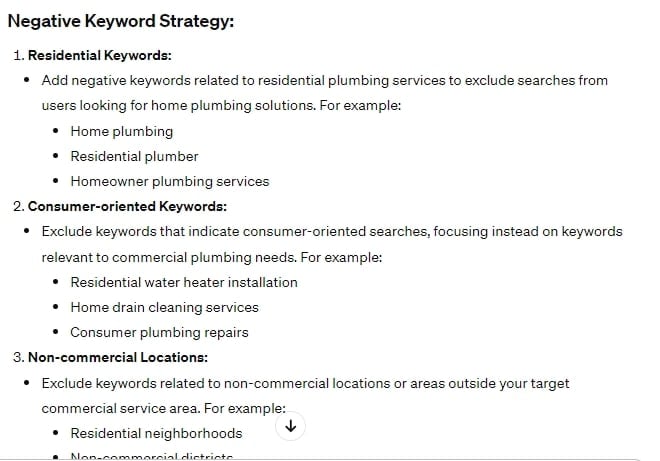
Verdict: Use ChatGPT for Keyword Brainstorming, Not Definitive Targeting
While I can see myself using ChatGPT to get initial/seed keyword ideas, I prefer the actual keyword tools like SpyFu to understand how keywords behave in a competitive landscape.
Then, I could plug them into ChatGPT to filter by search intent.
Use Case #5: ChatGPT Can Generate Your Google Ads Headlines and Descriptions
Often, you’ll spend a lot of time trying to come up with different Google Ads headlines and descriptions for your responsive search ads.
Why not jumpstart the process with ChatGPT?
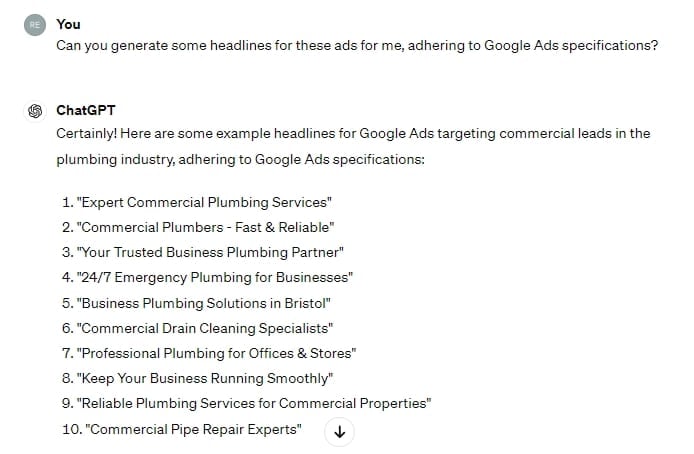
You can ask ChaTGPT to iterate on a specific headline or change the tone of voice to get better-fit headlines.
(Remember that ChatGPT isn’t good at counting, so check the character count yourself.)
Unfortunately, the descriptions are much too verbose and fluffy to generate any significant clicks.
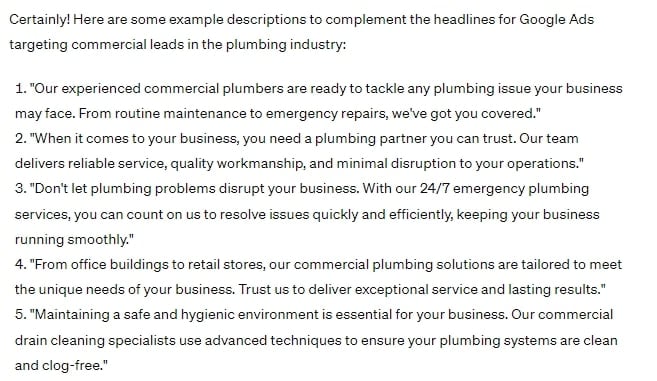
Use Case #6: Landing Page Magic, Brought to You by ChatGPT and Google Ads
You’ll need a good landing page if you want to increase your ad’s Quality Score to reduce your CPC. Unfortunately, copywriting isn’t always easy.
Fortunately, ChatGPT can help!
Write the First Draft of the Landing Page Copy with ChatGPT
When I gave it the prompt, ChatGPT fired off and created this draft. Granted, it’s not something I’d publish immediately (I would need to edit it substantially), but it’s a good start when you’re stuck:
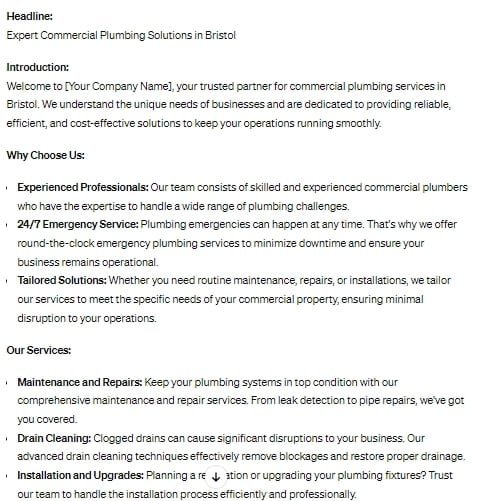
Bonus tips
- Specify your tone of voice and style. Ask ChatGPT to make your copy more conversational, friendly or funny!
- Give ChatGPT plenty of information about your business that it can use to make the copy more specific, not generic.
- Didn’t include information in the first prompt? No problem! Simply follow up, asking it to modify the answer with new data.
ChatGPT Can Create Other Pages, Too
I loved the results when asking for an “About us” page for a family-run plumbing business in a casual tone of voice (with an emphasis on expertise).
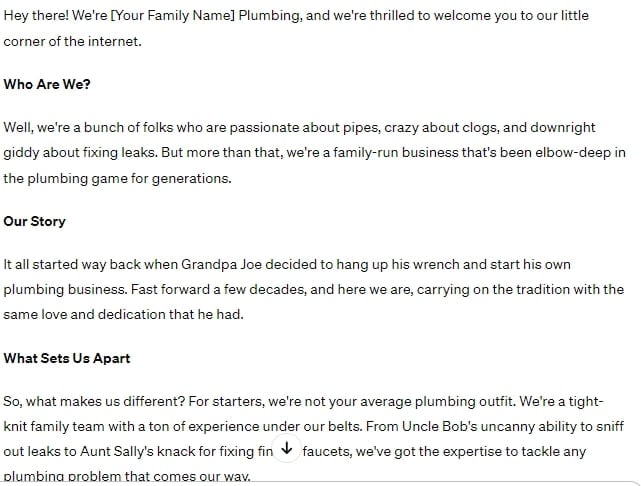
While fun, it tries too hard, crossing the bridge into the comedy side of things. I’d definitely edit this or ask ChatGPT to revise it to reduce the humour.
Still, make sure you fact-check ChatGPT. It’s also prone to repetition, which you’ll definitely want to remove.
Get Landing Page Design Suggestions
Once I had the copy, I wanted to know what the landing page should look like. Could ChatGPT help? Of course, it didn’t generate the actual landing page (although it could instruct me to do so myself), but it offered best practices:
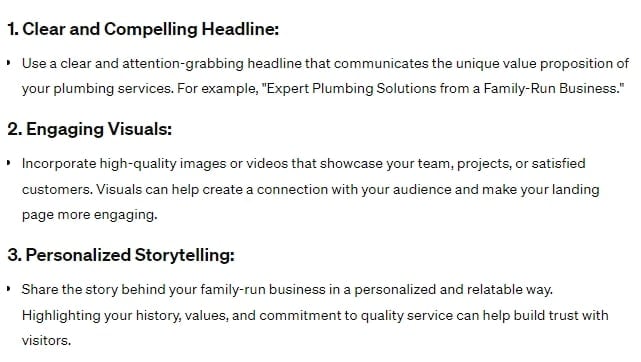
Use Case #7: ChatGPT Generates Scripts for YouTube Ads
Now that we know ChatGPT can help with basic tasks, let’s talk about the more headache-inducing efforts. Can it create scripts for Google Ads for YouTube, and are they any good?
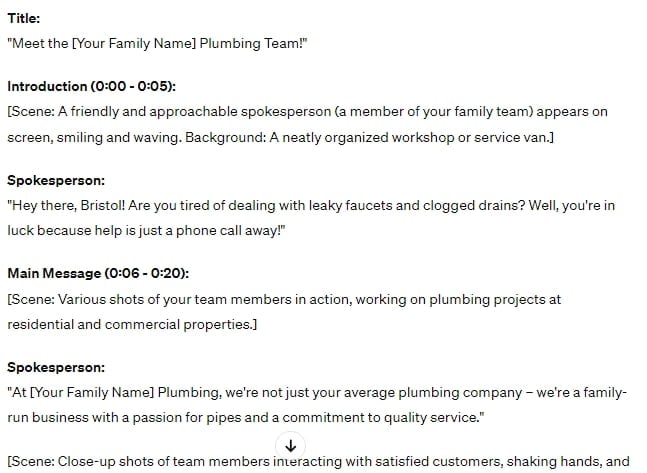
I’ll be honest: I might really start using ChatGPT to generate scripts for YouTube ads. This is great!
It’s simple but covers all the crucial areas, from services to visuals and cues.
Use Case #8: Can ChatGPT Research Your Competitors?
Unfortunately, its data isn’t always accurate. For example, it couldn’t find any specific plumbing competitors, stating that it doesn’t have access to fresh data, but I could use search engines.
One thing you could do is ask it to summarise data.
For example, if you had a bunch of raw data on your competitors, you could copy it and ask ChatGPT to format it as a table and filter by specific criteria.
Similarly, you could insert your competitors’ PPC copy or keywords that you’ve sourced from Google or a tool like SpyFu, and then ask ChatGPT to help you spot any gaps in their value propositions, CTAs, descriptions, and more.
Use Case #9: ChatGPT and Audience Research for Google AdWords
If you want to launch a new business or product, ChatGPT could offer audience ideas, allowing you to reach your targets more effectively.
For example, it generated an exciting scenario for the plumbing business, mentioning commercial clients and the services they’d be interested in.
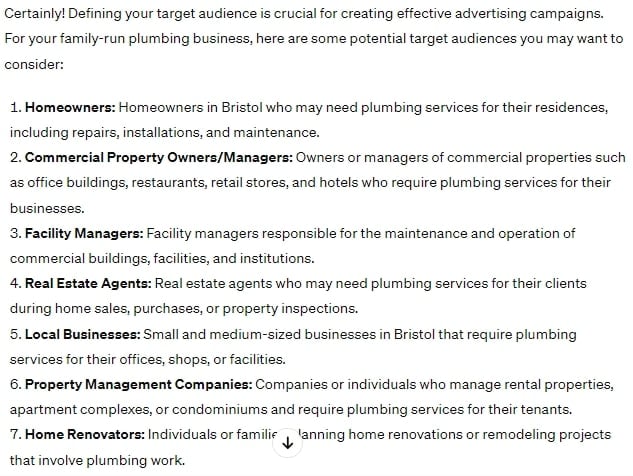
Then, I asked which methods we could use to reach target group #7. ChatGPT offered specific suggestions, including using local SEO and even using direct mail!
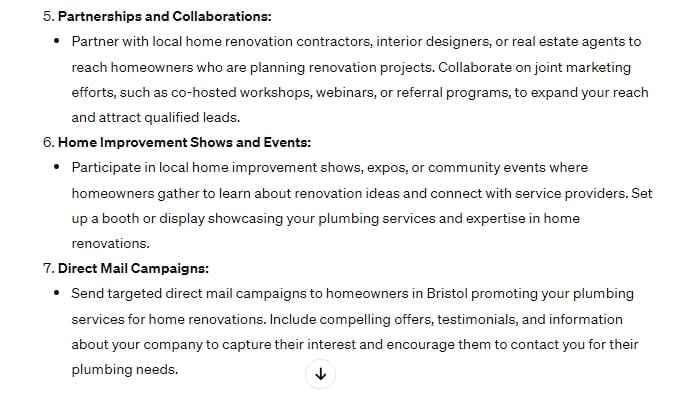
Again, you won’t be able to replace yourself or a Google Ads management service altogether, but ChatGPT is fantastic for research.
Use Case #10: Which Google Ad Extensions Should You Use?
Finally, I’ve asked ChatGPT to suggest the most relevant ad extensions for our fictional plumbing campaign (bearing in mind it was last updated in 2021, so recent types will be excluded). For example, it may suggest the best description copy or approaches to Google Ads lead form extensions.
In addition to listing the relevant extensions, it also provided sample copy.

Use Case #11: Analyse Performance and Google Ads Data with ChatGPT
If you get a headache whenever you look at your performance data and aren’t sure what to make of it but you’re not keen on contacting a Google Ads agency, ChatGPT can help — to some degree.
Export your data (HTML or spreadsheet) and copy-paste it into ChatGPT. (You can also use the Code Interpreter plugin, a new feature which opens up additional use cases if you frequently work with code like Python.)
Then, ask it to analyse your data and generate an easily understandable report.
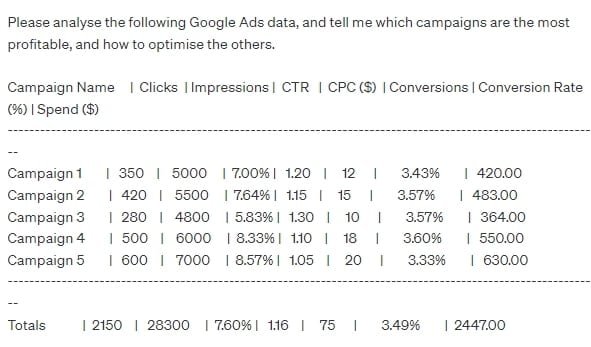
To which ChatGPT responded in two ways. First, it gave me a long explanation of how to do it myself (which can be very useful if you’re a beginner), and then – after my additional prompt – it provided a quick breakdown of campaign profitability:
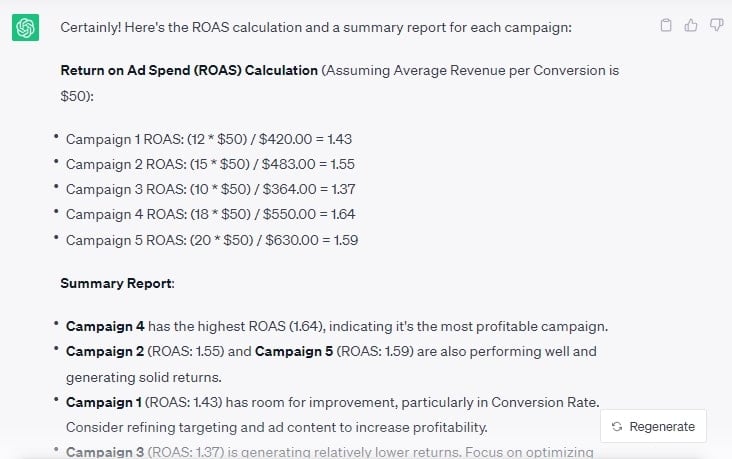
Keep in mind that this is just one use case. Since it can analyse data in bulk, you can ask it to review your campaign performance for hundreds of keywords to show you the most profitable ones according to your set criteria, and much, much more!
When Should You Skip ChatGPT?
I’ve experimented with different use cases, but the 10+ above are the ones I found to be the most valuable.
Unfortunately, ChatGPT wasn’t as successful with the following:
- Budgeting
- Providing definitive pointers for bidding strategies
- Campaign optimisation suggestions
- Actual, hands-on research (I’d still have to research my plumbing competitors manually)
- Keyword research (it doesn’t have access to accurate keyword volume and other data)
Still, I was pleasantly surprised with what it could do.
A Note on ChatGPT Plugins for Google Ads and PPC
At this point, I have to touch on third-party ChatGPT plugins that promise to help with your Google Ads, such as bulk ad uploaders, competitor research plugins, and the like.
I’m not advising you not to test them. However, be extremely careful and sanity-check the data so you don’t act on outdated, irrelevant, or plain-and-simple incorrect information.
The Future of Google Ads and ChatGPT
There’s no doubt about it: ChatGPT is here to stay.
It’s currently most useful for research and repetitive tasks, but as more companies start using OpenAI’s model, we might see proprietary algorithms trained on successful ads.
(After all, Google has already been doing something similar with its recommendations.)
But, as with any new technology, don’t be quick to replace yourself.
If you want to launch a profitable campaign, the best path is still understanding how to make Google Ads work for your business. Then, you’ll know exactly how to slot ChatGPT and AI into your process to make the most of them!
If you need help, get your copy of my best-selling Google Ads book to set up a successful campaign in 7 steps or get in touch for a tailored Google Ads success plan.


